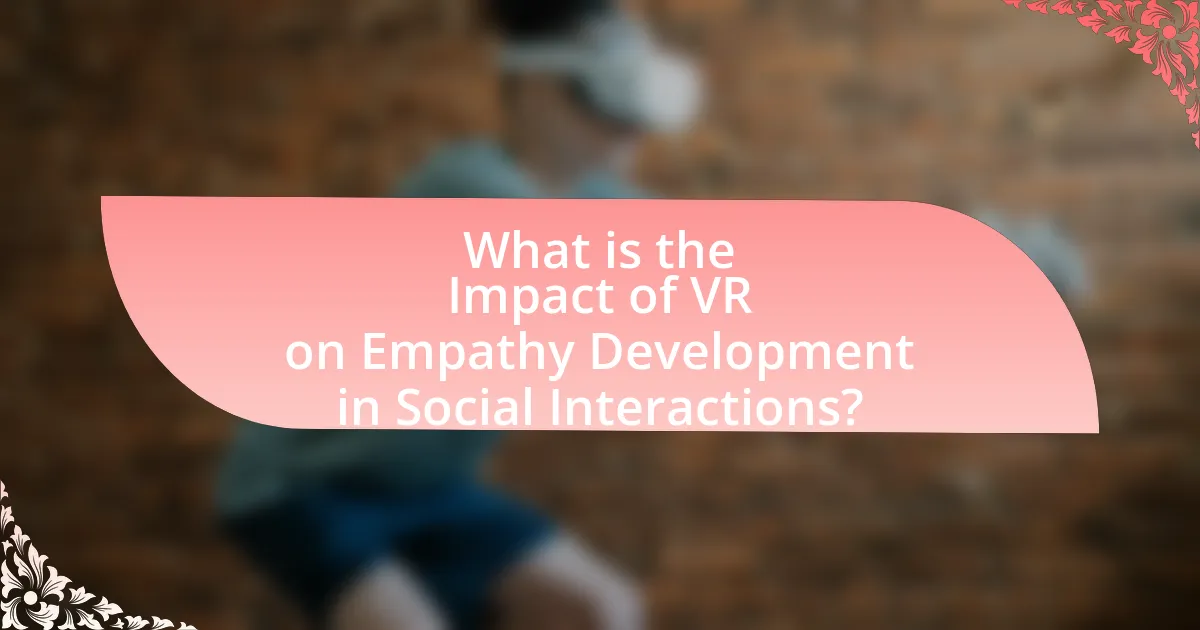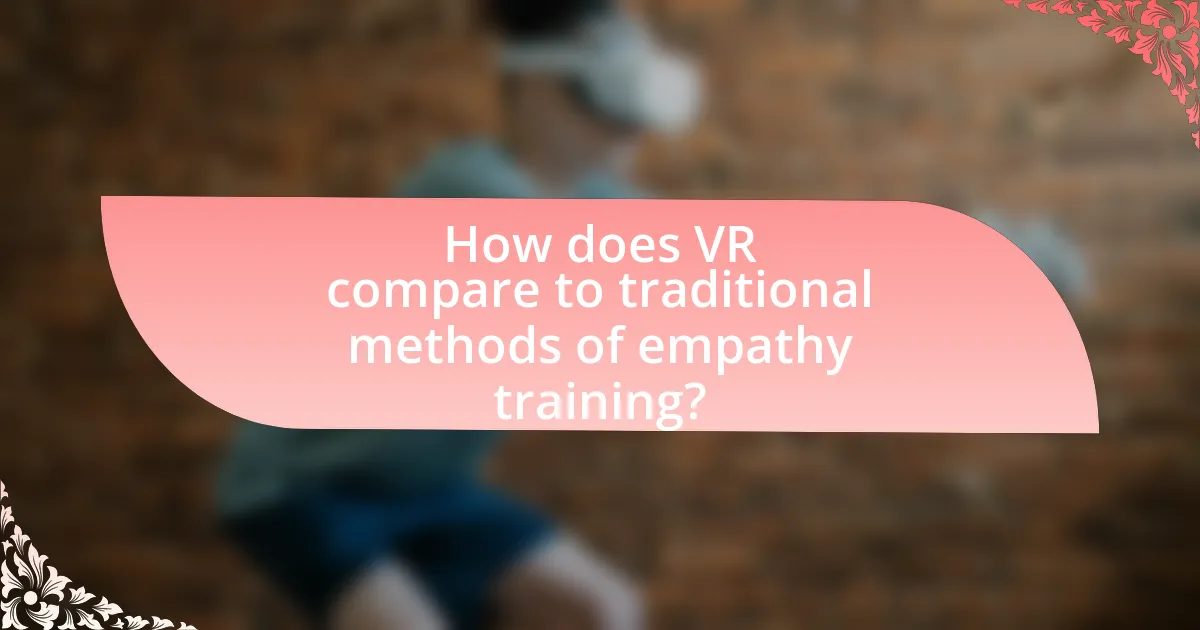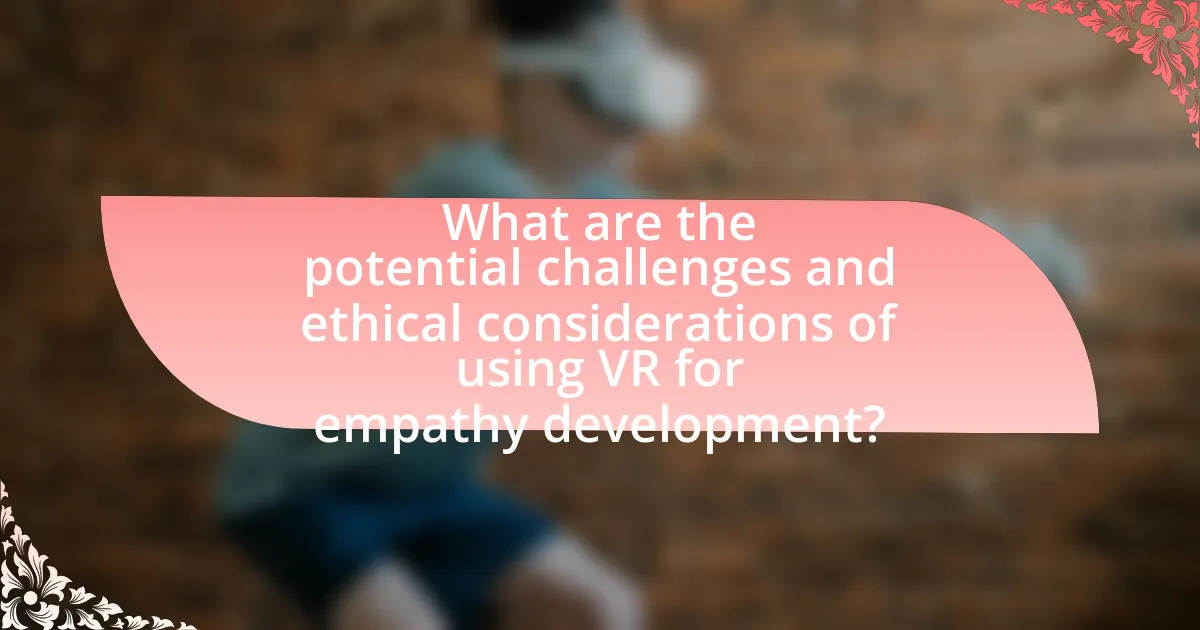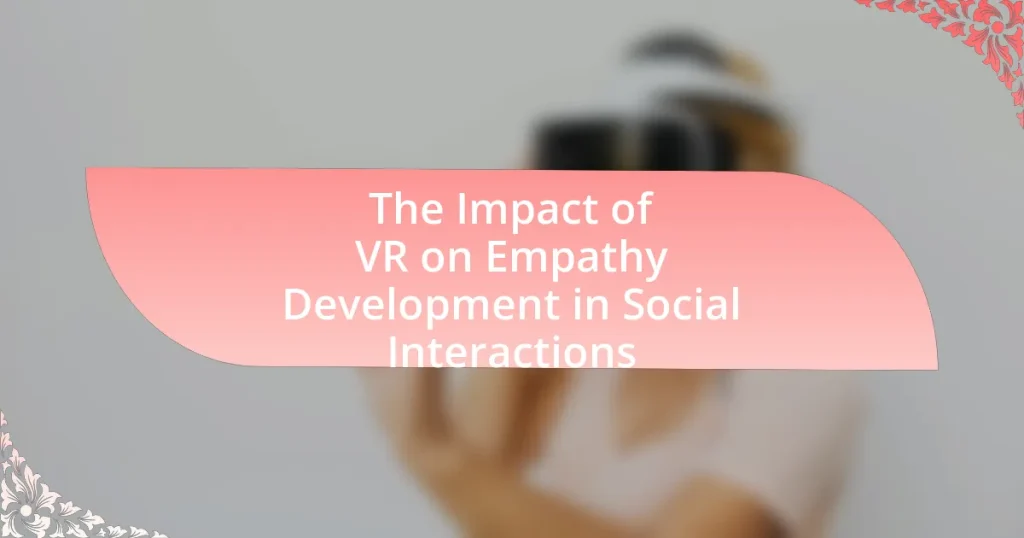The article examines the impact of Virtual Reality (VR) on empathy development in social interactions, highlighting how immersive experiences can foster emotional connections and understanding. It discusses key features of VR, such as perspective-taking and interactivity, which enhance empathetic experiences compared to traditional methods. Research findings indicate that VR can significantly increase empathy levels by allowing users to experience situations from different viewpoints, thereby promoting deeper social understanding. Additionally, the article addresses the potential challenges and ethical considerations associated with using VR for empathy training, including psychological impacts and data privacy concerns.

What is the Impact of VR on Empathy Development in Social Interactions?
Virtual Reality (VR) significantly enhances empathy development in social interactions by immersing users in experiences that foster emotional connections. Research indicates that VR can simulate real-life scenarios, allowing individuals to experience situations from different perspectives, which promotes understanding and compassion. For instance, a study published in the journal “Frontiers in Psychology” by Bailenson et al. (2008) demonstrated that participants who engaged in VR experiences that placed them in the shoes of marginalized groups reported increased empathy towards those groups. This immersive experience activates emotional responses that traditional media cannot replicate, thereby facilitating deeper social understanding and empathy.
How does VR technology facilitate empathy development?
VR technology facilitates empathy development by immersing users in experiences that allow them to see the world from another person’s perspective. This immersive experience can evoke emotional responses and foster a deeper understanding of diverse social situations. Research conducted by Bailenson et al. (2008) demonstrated that participants who experienced a virtual simulation of being an elderly person reported increased empathy towards the elderly, highlighting how VR can effectively alter perceptions and enhance emotional connections. By simulating real-life scenarios, VR encourages users to engage with and reflect on the feelings and experiences of others, thereby promoting empathetic understanding.
What are the key features of VR that enhance empathetic experiences?
The key features of VR that enhance empathetic experiences include immersive environments, perspective-taking, and interactivity. Immersive environments allow users to feel physically present in a virtual space, which can evoke emotional responses similar to real-life experiences. Perspective-taking enables users to experience situations from another person’s viewpoint, fostering understanding and compassion. Interactivity allows users to engage with virtual characters and scenarios, making emotional connections more profound. Research by Bailenson et al. (2008) in “Transformed Social Interaction in Social Virtual Reality” demonstrates that these features significantly increase empathy by allowing individuals to experience the emotions and challenges of others in a controlled setting.
How does immersion in VR environments influence emotional responses?
Immersion in VR environments significantly enhances emotional responses by creating a sense of presence that engages users on a deeper psychological level. This heightened engagement leads to stronger emotional reactions, as individuals often feel as though they are truly part of the virtual experience. Research by Bailenson et al. (2008) demonstrates that immersive VR can evoke empathy by allowing users to experience situations from different perspectives, thereby fostering emotional connections. Additionally, studies indicate that the realism of VR scenarios can trigger physiological responses, such as increased heart rate and galvanic skin response, which further amplify emotional engagement.
Why is empathy important in social interactions?
Empathy is crucial in social interactions because it fosters understanding and connection between individuals. When people demonstrate empathy, they can better comprehend others’ feelings and perspectives, which enhances communication and strengthens relationships. Research indicates that empathetic interactions lead to increased cooperation and reduced conflict, as individuals are more likely to consider the emotional states of others. For instance, a study published in the journal “Emotion” by Decety and Jackson (2004) found that empathy significantly influences prosocial behavior, highlighting its role in promoting social harmony.
What role does empathy play in effective communication?
Empathy is crucial for effective communication as it fosters understanding and connection between individuals. When communicators demonstrate empathy, they are better able to interpret emotions, respond appropriately, and build trust, which enhances the overall quality of interactions. Research indicates that empathetic communication leads to more positive outcomes in conversations, as it allows individuals to feel heard and valued, thereby reducing misunderstandings and conflicts. For instance, a study published in the Journal of Personality and Social Psychology found that empathy significantly improves relational satisfaction and cooperation in interpersonal exchanges.
How does empathy contribute to conflict resolution in social settings?
Empathy significantly contributes to conflict resolution in social settings by fostering understanding and connection between conflicting parties. When individuals can empathize, they are more likely to recognize and appreciate each other’s perspectives, which can lead to de-escalation of tensions. Research indicates that empathy enhances communication, allowing for more effective dialogue and negotiation, ultimately facilitating collaborative problem-solving. For instance, a study published in the Journal of Conflict Resolution found that empathetic engagement reduces hostility and promotes cooperative behaviors, leading to more successful conflict outcomes.
What research supports the impact of VR on empathy development?
Research indicates that virtual reality (VR) significantly enhances empathy development. A study by Bailenson et al. (2008) demonstrated that participants who experienced VR simulations of being in another person’s body reported increased empathy towards that individual’s experiences. Additionally, a meta-analysis by Riva et al. (2016) found that immersive VR environments can foster emotional engagement and perspective-taking, which are critical components of empathy. These findings suggest that VR can effectively promote empathetic understanding by allowing users to experience situations from different viewpoints.
What studies have been conducted on VR and empathy?
Numerous studies have been conducted on the relationship between virtual reality (VR) and empathy. One significant study by Bailenson et al. (2008) titled “Transformed Social Interaction in Social Virtual Reality” demonstrated that VR can enhance empathy by allowing users to experience perspectives of others in immersive environments. Another notable research is by Herrmann et al. (2019), which found that participants who engaged in VR experiences depicting social injustices reported increased empathic concern and prosocial behavior. Additionally, a meta-analysis by Krokos et al. (2019) indicated that VR experiences significantly improve emotional responses and empathy levels compared to traditional media. These studies collectively support the notion that VR can be a powerful tool for fostering empathy in social interactions.
What are the findings regarding VR’s effectiveness in fostering empathy?
Virtual reality (VR) has been found to be effective in fostering empathy by immersing users in experiences that allow them to understand and share the feelings of others. Research indicates that VR can enhance empathetic responses by providing users with a first-person perspective of different social situations, which can lead to increased emotional engagement and understanding. For instance, a study published in the journal “Frontiers in Psychology” by authors Bailenson et al. (2008) demonstrated that participants who experienced a VR simulation of being an elderly person reported greater empathy towards the elderly compared to those who did not use VR. This evidence supports the notion that VR can serve as a powerful tool for empathy development in social interactions.

How does VR compare to traditional methods of empathy training?
Virtual Reality (VR) enhances empathy training more effectively than traditional methods by immersing users in realistic scenarios that evoke emotional responses. Traditional methods, such as role-playing or lectures, often lack the immersive quality that VR provides, which can lead to a more profound understanding of others’ experiences. Research conducted by the University of Maryland found that participants using VR reported a 30% increase in empathy levels compared to those engaged in conventional training methods. This evidence suggests that VR’s ability to simulate real-life situations fosters deeper emotional connections and understanding, making it a superior tool for empathy development in social interactions.
What are the limitations of traditional empathy training methods?
Traditional empathy training methods often lack engagement and fail to provide immersive experiences, which limits their effectiveness in fostering genuine empathetic understanding. These methods typically rely on lectures, role-playing, or discussions that do not fully simulate real-life emotional scenarios, resulting in superficial learning. Research indicates that traditional approaches may not adequately address the complexities of emotional responses, as they often overlook the importance of experiential learning. For instance, a study published in the Journal of Personality and Social Psychology found that individuals who engaged in immersive experiences demonstrated significantly higher levels of empathy compared to those who participated in conventional training. This highlights the need for more innovative methods, such as virtual reality, to enhance empathy development in social interactions.
How do traditional methods fail to engage participants fully?
Traditional methods fail to engage participants fully due to their reliance on passive learning techniques, which limit interaction and emotional involvement. For instance, lectures and standard presentations often result in low retention rates, with studies indicating that people remember only about 10% of what they hear in a lecture after three days. This lack of engagement can lead to diminished empathy development, as participants are not actively involved in the learning process. In contrast, immersive experiences, such as virtual reality, have been shown to enhance emotional connections and understanding, making them more effective for fostering empathy in social interactions.
What are the challenges in measuring empathy through conventional approaches?
Measuring empathy through conventional approaches faces significant challenges due to the subjective nature of empathy itself. Traditional methods often rely on self-report questionnaires, which can be biased and influenced by social desirability, leading to inaccurate assessments of an individual’s empathetic abilities. Additionally, these approaches may not capture the complexity of empathy, as they often fail to differentiate between cognitive empathy (understanding others’ feelings) and affective empathy (sharing others’ feelings). Research indicates that conventional measures may overlook situational factors that influence empathetic responses, such as context and individual differences in emotional regulation. Furthermore, the lack of standardized metrics across studies complicates the comparison of findings, making it difficult to draw definitive conclusions about empathy levels across different populations.
What advantages does VR offer over traditional methods?
VR offers immersive experiences that enhance empathy development more effectively than traditional methods. Unlike conventional approaches, which often rely on passive observation or reading, VR allows users to actively engage in scenarios that simulate real-life interactions and perspectives. Research indicates that participants in VR environments demonstrate increased emotional responses and understanding of others’ experiences, as evidenced by a study published in the journal “Computers in Human Behavior,” which found that VR can significantly improve empathetic responses compared to traditional media. This active engagement fosters a deeper connection to the emotions and situations of others, making VR a powerful tool for enhancing empathy in social interactions.
How does VR create a more immersive learning environment?
VR creates a more immersive learning environment by simulating real-world scenarios that engage users in a multi-sensory experience. This technology allows learners to interact with 3D environments and characters, enhancing their emotional and cognitive engagement. Research indicates that immersive experiences in VR can lead to increased empathy, as users can experience situations from different perspectives, fostering a deeper understanding of social interactions. For instance, a study published in the journal “Computers in Human Behavior” by Bailenson et al. (2008) demonstrated that participants who experienced a VR simulation of a social scenario showed greater empathy towards others compared to those who learned through traditional methods.
What unique experiences can VR provide that traditional methods cannot?
Virtual Reality (VR) provides immersive experiences that traditional methods cannot, particularly in fostering empathy through simulated social interactions. VR allows users to embody different perspectives, enabling them to experience situations from the viewpoint of others, which enhances emotional understanding and connection. Research by Bailenson et al. (2008) demonstrated that participants who experienced a VR simulation of being an elderly person reported increased empathy towards the elderly compared to those who engaged in traditional methods like reading or watching videos. This unique capability of VR to create a sense of presence and emotional engagement in diverse social contexts is unmatched by conventional approaches.

What are the potential challenges and ethical considerations of using VR for empathy development?
The potential challenges and ethical considerations of using VR for empathy development include issues of psychological impact, data privacy, and the risk of desensitization. Psychological impact arises from the immersive nature of VR, which can lead to intense emotional experiences that may be difficult for users to process. Data privacy concerns stem from the collection of personal data during VR experiences, raising questions about consent and the potential misuse of sensitive information. Additionally, the risk of desensitization occurs when repeated exposure to virtual suffering diminishes emotional responses, potentially undermining the intended empathetic outcomes. These challenges highlight the need for careful design and ethical guidelines in VR applications aimed at fostering empathy.
What are the risks associated with VR experiences in empathy training?
VR experiences in empathy training carry several risks, including desensitization, emotional distress, and the potential for reinforcing stereotypes. Desensitization occurs when users become numb to the emotional experiences of others due to repeated exposure to virtual scenarios, which can diminish genuine empathetic responses in real-life situations. Emotional distress may arise from intense virtual experiences that simulate trauma or suffering, leading to psychological discomfort or anxiety for participants. Additionally, VR can inadvertently reinforce stereotypes if the scenarios presented are not carefully designed, potentially leading to biased perceptions rather than fostering true understanding. These risks highlight the need for careful implementation and monitoring of VR empathy training programs to ensure they achieve their intended outcomes without causing harm.
How can VR experiences lead to emotional distress or discomfort?
VR experiences can lead to emotional distress or discomfort by immersing users in intense, realistic scenarios that may trigger anxiety, fear, or trauma. For instance, simulations of distressing events, such as natural disasters or violent encounters, can evoke strong emotional reactions due to the immersive nature of VR, which can make users feel as though they are actually experiencing these situations. Research indicates that individuals with pre-existing mental health conditions, such as PTSD, may be particularly vulnerable to these effects, as the immersive environment can exacerbate their symptoms. A study published in the journal “Cyberpsychology, Behavior, and Social Networking” found that participants exposed to VR environments simulating traumatic events reported higher levels of anxiety and discomfort compared to those in non-immersive settings.
What measures can be taken to mitigate negative effects during VR sessions?
To mitigate negative effects during VR sessions, users should take regular breaks, adjust the VR settings for comfort, and ensure a safe physical environment. Regular breaks help reduce fatigue and discomfort, as studies indicate that prolonged VR use can lead to symptoms like motion sickness and eye strain. Adjusting settings, such as reducing the field of view or lowering the graphics quality, can enhance comfort and minimize disorientation. Additionally, maintaining a clutter-free space prevents physical accidents, which is crucial for user safety during immersive experiences.
What ethical concerns arise from using VR in social interactions?
The ethical concerns arising from using VR in social interactions include issues of privacy, consent, and the potential for desensitization to real-world emotions. Privacy concerns stem from the collection of personal data during VR experiences, which can be exploited without user consent. For instance, a study by the University of Southern California highlighted that VR platforms often track user behavior and interactions, raising questions about data security and user autonomy. Additionally, the lack of informed consent in VR environments can lead to users being exposed to manipulative or harmful content without their explicit agreement. Furthermore, repeated exposure to simulated social interactions may desensitize individuals to genuine emotional responses, as indicated by research from Stanford University, which found that immersive experiences can alter empathy levels. These ethical issues necessitate careful consideration in the design and implementation of VR technologies in social contexts.
How does VR impact the authenticity of social interactions?
VR significantly alters the authenticity of social interactions by creating immersive environments that can enhance or detract from genuine human connection. Research indicates that VR can foster empathy by allowing users to experience situations from different perspectives, thereby increasing understanding and emotional engagement. For instance, a study by Bailenson et al. (2008) demonstrated that participants who embodied avatars in VR scenarios reported higher levels of empathy towards others, suggesting that the medium can facilitate more authentic emotional exchanges. However, VR can also lead to superficial interactions, as users may prioritize virtual experiences over real-life connections, potentially diminishing the depth of social relationships. Thus, while VR has the potential to enhance empathy and authenticity in some contexts, it can also create barriers to genuine social engagement.
What are the implications of data privacy in VR empathy training?
Data privacy in VR empathy training has significant implications, primarily concerning the protection of personal data collected during immersive experiences. As VR systems often gather sensitive information, including user behavior, emotional responses, and biometric data, the risk of data breaches and unauthorized access increases. For instance, a study by the Electronic Frontier Foundation highlights that VR platforms can track users’ movements and interactions, raising concerns about how this data is stored and used. Furthermore, the ethical responsibility of developers to ensure user consent and transparency in data handling is paramount, as violations can lead to loss of trust and potential legal repercussions. Thus, maintaining robust data privacy measures is essential for the credibility and effectiveness of VR empathy training programs.
What practical tips can enhance the effectiveness of VR in empathy development?
To enhance the effectiveness of VR in empathy development, it is crucial to design immersive experiences that allow users to fully engage with diverse perspectives. This can be achieved by incorporating realistic scenarios that simulate real-life challenges faced by different social groups, thereby fostering emotional connections. Research indicates that VR experiences that include narrative storytelling and character development significantly increase empathy levels, as users can relate to the characters’ emotions and situations. For instance, a study by Bailenson et al. (2008) demonstrated that participants who experienced a VR simulation of being an elderly person reported higher empathy towards the elderly compared to those who did not. Additionally, providing opportunities for reflection after the VR experience can deepen understanding and retention of empathetic insights, as users can process their feelings and thoughts about the experience.
How can facilitators create engaging VR scenarios for empathy training?
Facilitators can create engaging VR scenarios for empathy training by designing immersive experiences that allow participants to embody diverse perspectives. This can be achieved through realistic simulations that replicate real-world challenges faced by different social groups, enhancing emotional connection and understanding. Research indicates that VR experiences can significantly increase empathy levels; for instance, a study by Bailenson et al. (2008) demonstrated that participants who experienced a VR scenario as a homeless person showed increased empathy towards the homeless in real life. By incorporating interactive elements, such as decision-making scenarios and narrative-driven content, facilitators can further enhance engagement and emotional impact, leading to more effective empathy training outcomes.
What best practices should be followed to ensure a positive VR experience?
To ensure a positive VR experience, users should prioritize comfort, appropriate content, and social interaction. Comfort can be achieved by adjusting headset fit and taking regular breaks to prevent motion sickness, which affects 40% of users according to studies. Selecting content that is engaging and relevant enhances immersion, as immersive experiences can increase empathy by allowing users to experience different perspectives. Additionally, fostering social interaction within VR environments can enhance emotional connections, as research indicates that shared experiences in VR can lead to greater empathy development.


